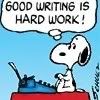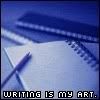First off--this is the 100th post!
So lets celebrate by discussing the reason we're here on this blog, anyway.
Critique Groups. What are they for? Why do we need them?
Critique Groups exist to help you better your craft.
There are multiple ways to look at the purpose for improving one's art of writing. None are less worthy than any other, however different goals do impact critique style. So it is of utmost importance that dominate goal of your critique group is synonymous with your personal writing goals.

Writing for Hobby
Some people dabble. They can live without writing, but they choose not to. I can't explain this well, because I don't understand it. I used to paint for fun, and draw. I drew because I wanted to see my characters, get a handle on how they dressed...I was visually world building. But it was driven by other needs in my life.
Perhaps that is what writers who write for a hobby are doing...wrestling with other drives. Writing for therapy. Or to understand some aspect of their world, a tiny sphere of it, just to go “Ah hah! Now I got it!” So the writing, itself, isn't the goal. The self-knowledge it generates may well be the true aim.

Writing for Art
When the story and characters haunt you and refuse to leave you alone, even when you have a long day of cleaning, cooking, grocery shopping and errand-attending-to hanging over your head, and no time to write, it is the writing itself that drives you. The art takes so much time to craft, and if you find yourself stealing 15 minute breaks at work to crouch over your notepad, or even spirit away your notebook to the bathroom to scratch out some ideas in a way no one will miss you...you got it bad.
Writing as a hobby won't sustain this need. The urge to write eats up chunks of your life. You start zoning out in the middle of conversations. You arrange a few hours here and there, but as painstakingly slow as the whole process is...these hours just aren't enough. And even when you hit dry periods, when life tosses obstacles in your way, you focus on developing techniques to keep you writing.
Myeslf? That's what started me blogging. At first I modeled what I posted from my favorite blogs, but over time I've begun to find my own voice. Precisely the same curve as fiction writing takes. Imitate what you like or the concept of what you think your chosen written form should look like, then you learn the true rules and ettiquette—why they exist—and upon implementation and adaptation you find your expression truly liberated. Suddenly the thoughts and emotions you want you reader to have...they have...even the ones who have never met you.
But I also derive inspiration from helping others. If I am in a place where Life and Writing are at odds, lest I tackle non-fiction, then I would like to see others get further down the road we both want to walk. I want to help them find the knowledge to hone craft, publish, proceed toward making at least part of their income from their writing. Recognition of hard work.

Writing for Publication
This is the realm of the successful writer. The writer who retains control of their art, and can consciously decide how much he/she wants to sacrifice for the ability to earn a living on writing alone. Or, precisely how frugally he/she can live and be content.
Goals here are to hone craft by better walking the line between self-expression and audience appeasement. While writing for art purposes can drive one to focus on how to communicate to his/her audience, that is not the same thing as appeasing said audience. Communicating lets the audience see/know what you want them too, based on what is best for your story. Appeasement means the audiences needs trump your creativity.
Just because someone “writes for publication” does not mean they are “selling out.” There are many aspects to writing for publication, chief of which is the ability to identify your audience. No human is 100% innately unique. We often feel that way. But in actuality, there are people who think like us, who like the same things we do, and despite their interests running in different arrangements and operating under different assumed categories, they are our built in audience. Who they are and how to reach them is determined by your ability to identify them, and give agents and publishers the knowledge they need to promote your book.
Promotion does not mean selling out. The modern concept seems to be that marketing of any sort means that a pursuit is “non-artistic.” But behind every artist whose name is even whispered, is a business. Not only is promotion—from fliers to press releases to article writing—essential to the advancement of any writer, it is the only way even the tiniest bits of recognition achieved for your hours of hard work.
The goals of the various levels of writing:

Dabbling Goals
For the person writing as a hobby, they want connection with other writers. Now, we all want this, but with different expectations of the relationship. Writing as a hobby means honest critique isn't the goal. Often these individuals want appreciation from a community of people who dabble in a similar fashion. True improvement of craft is not the goal, because the plan at the end of the day is to stuff the writing in a drawer.
Does this mean that dabblers aren't good writers? On the contrary, they can have a lot of skill. They just don't care weather they do or not. They don't want recognition beyond a narrowly defined clique, sometimes inclusive of family and/or friends. Dabblers seek other writers to join in a quest of self-expression with. It's an activity, like a club. Not a serious endeavor.

Writing for Artistic Goals
As writing drives expression, and expression transcends hobby and becomes part of one's life as essential as eating dinner, the writer is driven to publish. This isn't a drive perpetuated by a quest for fame (necessarily) but for a little recognition. Our society recognizes hard work monetarily. We give children allowance for chores, or good grades, etc. We pay laborers based on hours worked. We derive salaries based on knowledge required, academic experience, and duties expected. Everything in our lives is commodified, and as such we are trained: recognition comes in the form of a paycheck.
The more hours spent honing craft for nothing else but the sake of the piece you are writing, the more imperative the question: “What should I get for this?” When you've sacrificed family time, time with friends, grades and sometimes even work hours for the sake of completing a manuscript it can become more than recognition that drives this move. It could be fiscal realities that prompt you to think publishing is a must.
When you are at this point in your writing career you are on the quest for knowledge. Not only knowledge about the craft of writing fiction, but writing query letters, researching agents. Who do you contact? How? What edge can you manufacture so that when your polished manuscript lands in the hands of an agent or editor they say: “Ah hah! I want this one!” How much control can you maintain over the situation to guarantee that if someone doesn't pick you up, it isn't because of some naivete or lack on your part?
Writers with these goals—the aspiring writer—needs other writers who are actively on the same journey they are. Only others at their same level can provide the thorough critiques that prepare them for publication. These writers don't need pats on the back, they need honest appraisals from others who have researched not only the industry but what the Reader sees on the page.

Writing for Publication
These writers need picky, quick, and detailed critiques that can help them sit down, fix and complete all changes needed for making a deadline. Their critiquing partners need to know their publishing goals: does this writer write for pure entertainment? Is there an artistic or political agenda? Etc. These determine the analysis and critiques given about content.
Choosing your group:
When choosing your critique group, be honest about your goals.
Be certain your group shares your same perspective.
Discuss your reasons for writing frequently.
A critique group that pats you on the back and finds mostly grammatical issues in your writing, and only what is awkward and unclear is not going to help you progress toward publication. That group is simply not thorough enough, and may be susceptible to dogmatic approaches to critiquing.
Likewise, a thorough critique that focuses on big issues, rather than the use of details to construct said big issues may give you too much to think about/fix on a deadline. If you are writing for publication and need that sort of critique, you will likely be asking for extensions :P
Discussions of why you write and for whom you write will define some of your goals here.
For instance, my response: I write for myself! But I'd really like others to see it. I want, someday, someone I don't know to come up to me and say “I loved your book! It inspired me to write, because you made writing feel like an enriching experience.” Okay, perhaps it won't be in exactly that wording, but that's the jist.
When your group does not share your goals it can be detrimental to everyone involved. Does this mean writers of all levels shouldn't associate? No. But they shouldn't be in the same critique groups.
What are your thoughts? What do you want out of your critique partners?








 6:05 PM
6:05 PM
 Drea
Drea


 Posted in:
Posted in: 

